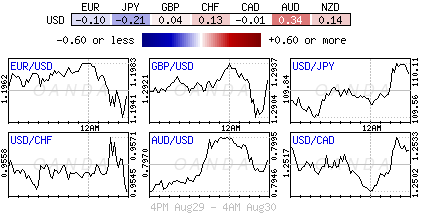Wednesday August 30: Five things the markets are talking about
Global equities are higher overnight as tensions surrounding North Korea have eased a tad. The yen (¥109.93) and Swiss franc ($0.9570) have dropped with gold as demand for haven assets began to fade.
President Trump’s ‘measured’ response to North Korea’s missile launch and comments from Kim Jong Un suggested the situation may not escalate has most sovereign bond prices falling as the risk-off mood diminished.
Data today stateside, Q2 GDP and core-price data along with the ADP’s monthly report on U.S hiring trends will set the tone for Friday’s ‘granddaddy’ of economic events, non-farm payrolls (NFP).
1. Stocks get the green light
In Japan, stocks regained ground lost after North Korea missile caused a four-month low. The Nikkei rallied +0.7% helped by exporters and a weaker yen, while the broader Topix index rose +0.6%.
In South Korea, the KOSPI index added +0.3%, while down-under, Australia’s S&P/ASX 200 Index was flat.
In Hong Kong, the Hang Seng index rallied +1.2%, while the China Enterprises Index gained +0.7%.
Note: In Hong Kong, the market has jumped roughly +28% in 2017, buoyed by China’s economic recovery and cross-border investment from Chinese investors.
In China, stocks traded relatively flat as stronger airlines and resources were offset by losses in the financial sector. Both the blue chip CSI300 index and the Shanghai Composite Index were unchanged.
In Europe, most bourses are trading higher across the board tracking the rebound seen in Asia overnight and the U.S yesterday.
U.S stocks are set to open in the black (+0.1%).
Indices: STOXX 600 +0.5% at 370.2, FTSE +0.3% at 7361, DAX +0.5% at 12006, CAC 40 +0.4% at 5049, IBEX 35 +0.3% at 10226, FTSE MIB flat at 10228, SMI +0.3% at 8836, S&P 500 Futures +0.1%
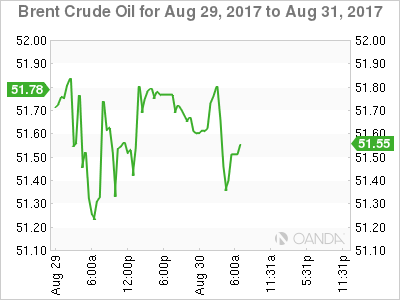
2. Crude slips as Harvey shuts a fifth of U.S fuel output, gold lower
Crude oil slid and gas jumped to its highest price in two-years as flooding and storm damage from Hurricane Harvey shut nearly a fifth of U.S refineries.
Note: Restarting plants even under the best conditions are expected to take a week or more.
Brent crude is down -30c at +$51.70 a barrel, while U.S light crude (WTI) fell -25c to +$46.19.
U.S gas was up more than +3% at +$1.8392 a gallon, while diesel advanced by +1.7% to +$1.6944 a gallon.
Note: In addition to shutting oil refineries due Harvey’s impact, about +1.4m bpd of U.S crude production has been disrupted, equivalent to +15% of total U.S output.
The impact of the storm overshadowed last week’s API report which showed Tuesday that U.S crude inventories fell by -5.78m barrels last week does not reflect the impact from Harvey.
The market will take its cue from today EIA report (10:30 am EDT) to compare with Tuesday’s API figures.
Gold prices have slipped overnight (down -0.1% at +$1,307.60), pressured by gains in the ‘big’ dollar amid perception of a brief lull in tensions over North Korea. However, prices of the ‘yellow metal’ remained supported on pullbacks as safe-haven demand remains supported that geopolitical risks could persist. It hit a nine-month peak yesterday at +$1,325.94.
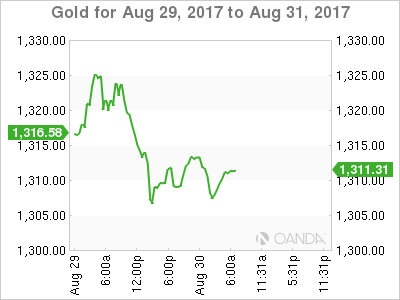
3. Yields back up as N. Korea fears abate
The gradual risk off sentiment has sovereign bond yields backing up a tad in overnight trade. U.S. 10-Year Treasury yields are at +2.14% ahead of the U.S open, after touching a nine-month intraday low of +2.08% yesterday.
In Europe, eurozone government bond yields have edged up as forecast-beating inflation in Spain (+2% y/y) and Germany (see below) defies the EUR’s recent strength. Gains of nearly +14% for the EUR outright should have held down prices in the bloc as imports become cheaper. Germany’s 10-Year yield increased +2 bps to +0.36%.
Elsewhere, Britain’s 10-Year yield gained +2 bps to +1.025%, the largest advance in more than a week.
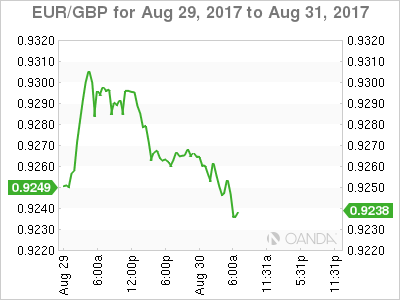
4.The “Big” dollar finds some traction
The ‘mighty’ dollar has managed to recover some of yesterday’s sharp losses following a North Korea missile launch, helped by Tuesday’s strong U.S consumer confidence data.
However, there remains little to dissuade investors from positioning in stronger activity/yield stories elsewhere in the world.
EUR/USD is down -0.2% at €1.1950, having traded well above €1.20 intraday yesterday. The pound has slipped further from the psychological £1.30 level, last down -0.1% at £1.2919, with the pound still seen vulnerable to a lack of progress in Brexit talks.
The yen and Swiss franc, which rallied hard yesterday on safe haven demand, have turned lower, with USD/JPY up +0.35% at ¥109.90 and USD/CHF up +0.06% at $0.9561. Down-under, the AUD has gained some ground, with AUD/USD trading just below A$0.80 at A$0.7970.
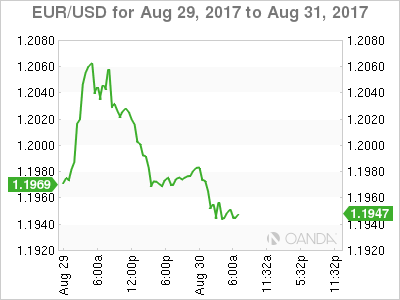
5. German State CPI data edging back towards the ECB target
Inflation data this morning from five German states suggest that Germany’s consumer price index harmonized according to EU standards – HICP rallied to about +1.7% this month, y/y.
However, with core-inflation, it’s still fairly soft which would suggest that the ECB might not be in any rush to begin tapering its QE program any time soon.
Digging deeper, energy inflation appears to have risen in line with expectations and the volatile food component seems to have seen an increase.
Expect the fixed income market to start pricing the ECB to begin to taper its asset purchases only slowly next year and put off raising interest rates until 2019.
